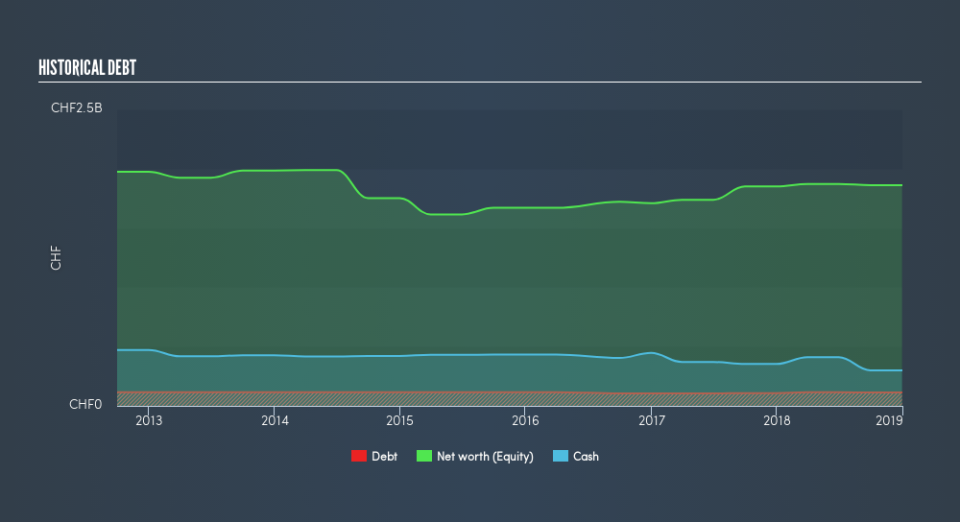We Think Romande Energie Holding (VTX:HREN) Can Stay On Top Of Its Debt

The external fund manager backed by Berkshire Hathaway's Charlie Munger, Li Lu, makes no bones about it when he says 'The biggest investment risk is not the volatility of prices, but whether you will suffer a permanent loss of capital.' So it might be obvious that you need to consider debt, when you think about how risky any given stock is, because too much debt can sink a company. We can see that Romande Energie Holding SA (VTX:HREN) does use debt in its business. But is this debt a concern to shareholders?
When Is Debt A Problem?
Debt is a tool to help businesses grow, but if a business is incapable of paying off its lenders, then it exists at their mercy. Ultimately, if the company can't fulfill its legal obligations to repay debt, shareholders could walk away with nothing. However, a more common (but still painful) scenario is that it has to raise new equity capital at a low price, thus permanently diluting shareholders. Having said that, the most common situation is where a company manages its debt reasonably well - and to its own advantage. The first thing to do when considering how much debt a business uses is to look at its cash and debt together.
Check out our latest analysis for Romande Energie Holding
How Much Debt Does Romande Energie Holding Carry?
As you can see below, at the end of December 2018, Romande Energie Holding had CHF113.2m of debt, up from CHF108.1m a year ago. Click the image for more detail. However, it does have CHF299.9m in cash offsetting this, leading to net cash of CHF186.7m.
A Look At Romande Energie Holding's Liabilities
The latest balance sheet data shows that Romande Energie Holding had liabilities of CHF124.8m due within a year, and liabilities of CHF240.7m falling due after that. On the other hand, it had cash of CHF299.9m and CHF180.4m worth of receivables due within a year. So it actually has CHF114.8m more liquid assets than total liabilities.
This surplus suggests that Romande Energie Holding has a conservative balance sheet, and could probably eliminate its debt without much difficulty. Succinctly put, Romande Energie Holding boasts net cash, so it's fair to say it does not have a heavy debt load!
But the other side of the story is that Romande Energie Holding saw its EBIT decline by 3.3% over the last year. If earnings continue to decline at that rate the company may have increasing difficulty managing its debt load. There's no doubt that we learn most about debt from the balance sheet. But it is future earnings, more than anything, that will determine Romande Energie Holding's ability to maintain a healthy balance sheet going forward. So if you want to see what the professionals think, you might find this free report on analyst profit forecasts to be interesting.
Finally, while the tax-man may adore accounting profits, lenders only accept cold hard cash. Romande Energie Holding may have net cash on the balance sheet, but it is still interesting to look at how well the business converts its earnings before interest and tax (EBIT) to free cash flow, because that will influence both its need for, and its capacity to manage debt. In the last three years, Romande Energie Holding created free cash flow amounting to 12% of its EBIT, an uninspiring performance. That limp level of cash conversion undermines its ability to manage and pay down debt.
Summing up
While we empathize with investors who find debt concerning, you should keep in mind that Romande Energie Holding has net cash of CHF187m, as well as more liquid assets than liabilities. So we don't have any problem with Romande Energie Holding's use of debt. Above most other metrics, we think its important to track how fast earnings per share is growing, if at all. If you've also come to that realization, you're in luck, because today you can view this interactive graph of Romande Energie Holding's earnings per share history for free.
At the end of the day, it's often better to focus on companies that are free from net debt. You can access our special list of such companies (all with a track record of profit growth). It's free.
We aim to bring you long-term focused research analysis driven by fundamental data. Note that our analysis may not factor in the latest price-sensitive company announcements or qualitative material.
If you spot an error that warrants correction, please contact the editor at editorial-team@simplywallst.com. This article by Simply Wall St is general in nature. It does not constitute a recommendation to buy or sell any stock, and does not take account of your objectives, or your financial situation. Simply Wall St has no position in the stocks mentioned. Thank you for reading.


